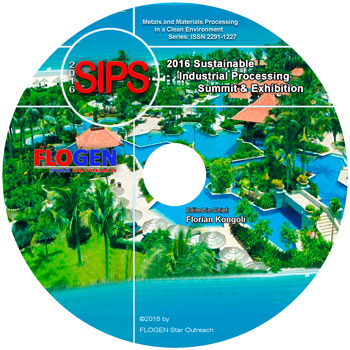2016-Sustainable Industrial Processing Summit
SIPS 2016 Volume 2: Dubois Intl. Symp. / Complex Metallic Systems
| Editors: | Kongoli F, Kobe S, Calin M, Dong C |
| Publisher: | Flogen Star OUTREACH |
| Publication Year: | 2016 |
| Pages: | 130 pages |
| ISBN: | 978-1-987820-38-6 |
| ISSN: | 2291-1227 (Metals and Materials Processing in a Clean Environment Series) |

CD shopping page
Tailoring Structure Formation and Properties of Complex Metallic Materials
Jürgen Eckert1;1ERICH SCHMID INSTITUTE OF MATERIALS SCIENCE, Leoben, Austria;
Type of Paper: Keynote
Id Paper: 165
Topic: 36
Abstract:
In modern society, metallic materials are crucially important (e.g. for applications related to energy, safety, infrastructure, transportation, health, medicine, life sciences, IT). Contemporary examples of inherent challenges to be overcome are the design of ultrahigh specific strength materials. There is a critical need for successful developments in this area in particular for reduced energy consumption, reduction of pollutant emissions and passenger safety. Also, the ageing society makes biomedical materials for implant and stent design crucially important. A drawback of nearly all current high strength metallic materials is that they lack ductility (i.e. are brittle and hard to form) - or on the opposite side, they may be highly ductile but lack strength. Hence, it is mandatory to develop new routes for a creation of tailored metallic materials based on hierarchical hybrid structures enabling property as well as function optimization. One starting point along these lines is the design of monolithic amorphous materials or bulk micro-, ultrafine- or nano-structured composite structures with intrinsic length-scale modulation and phase transformation under highly non-equilibrium conditions. This can include the incorporation of dispersed phases which are close to or beyond their thermodynamic and mechanical stability limit thus forming hierarchically structured hybrid and ductile/tough alloys. Alternatively, the material itself can be designed in a manner such that it is on the verge of its thermodynamic/mechanical stability.
This talk will present recent results obtained for metallic glass-based hybrid structures with transformation effects at different length-scales and microcrystalline-grained hybrid structures based on elastic instabilities and modulated length-scale. The deformation behaviour and possible phase transitions during deformation will be related to the intrinsic properties of the phases as well as the microstructure of the material including heterogeneities and length-scale modulation in order to derive guidelines for the design of macroscopically ductile high-strength materials. Finally, the results will be critically assessed from the viewpoint of possible scaling-up for technological applications and the use of simple and cost effective processing technologies.